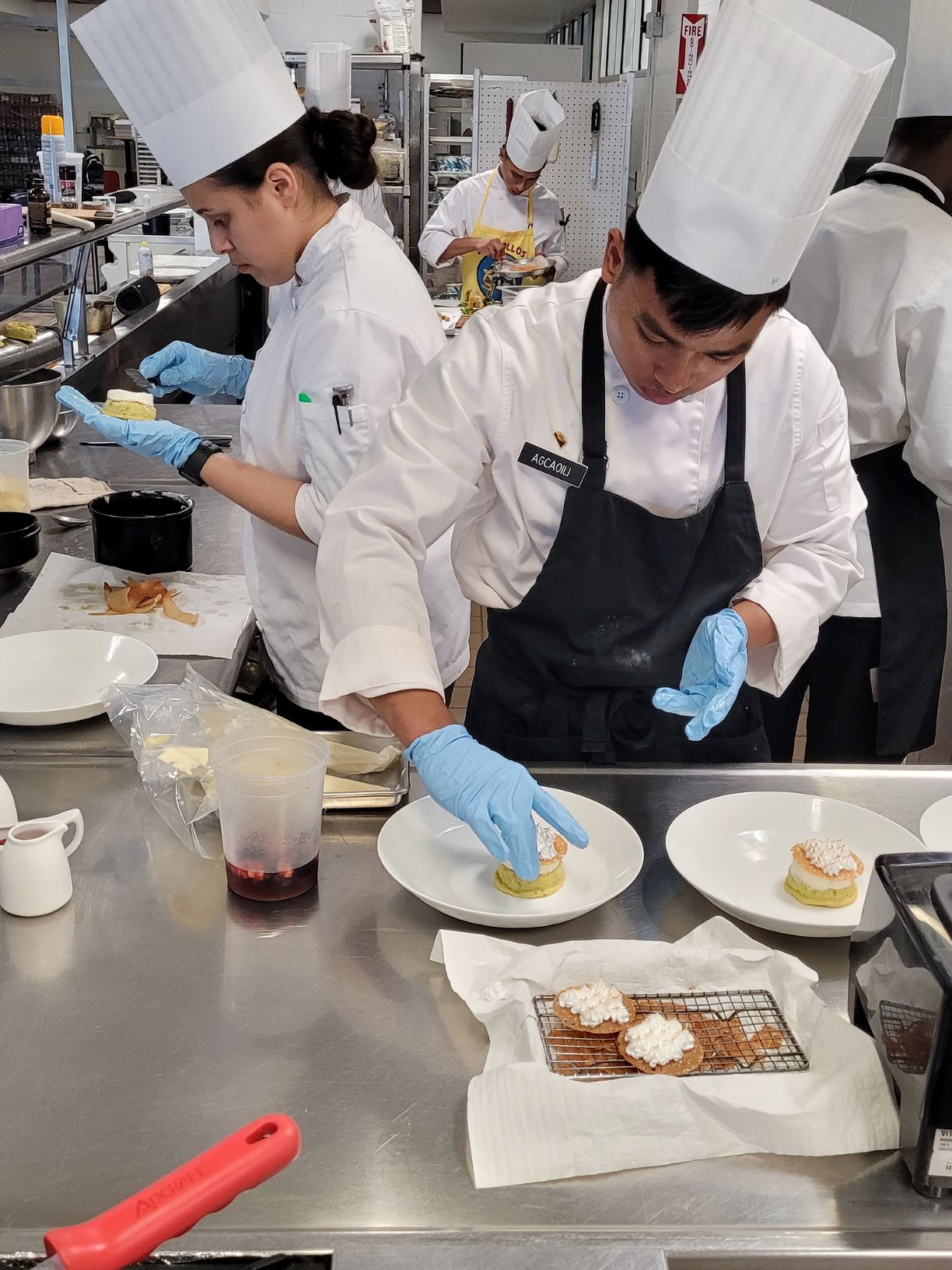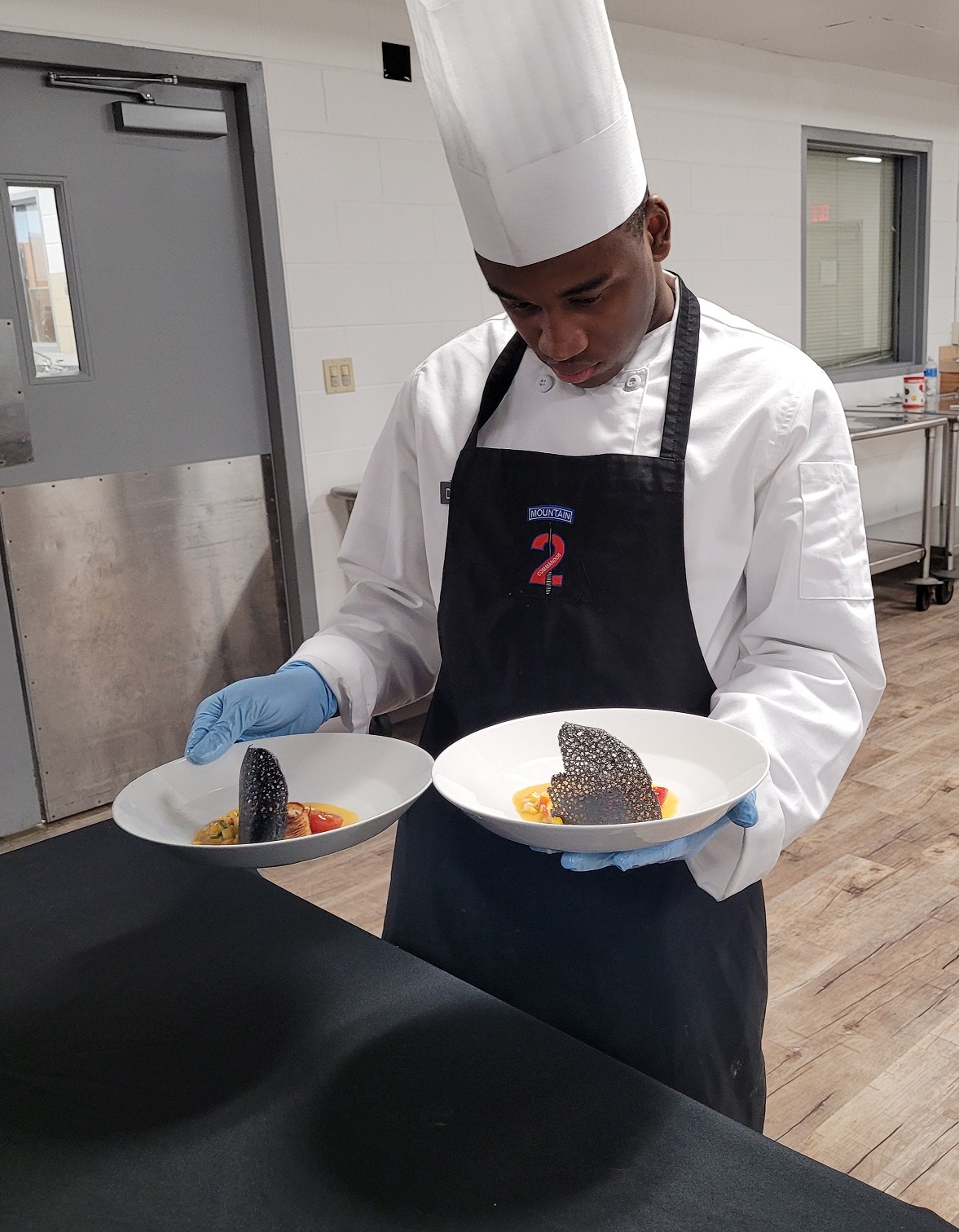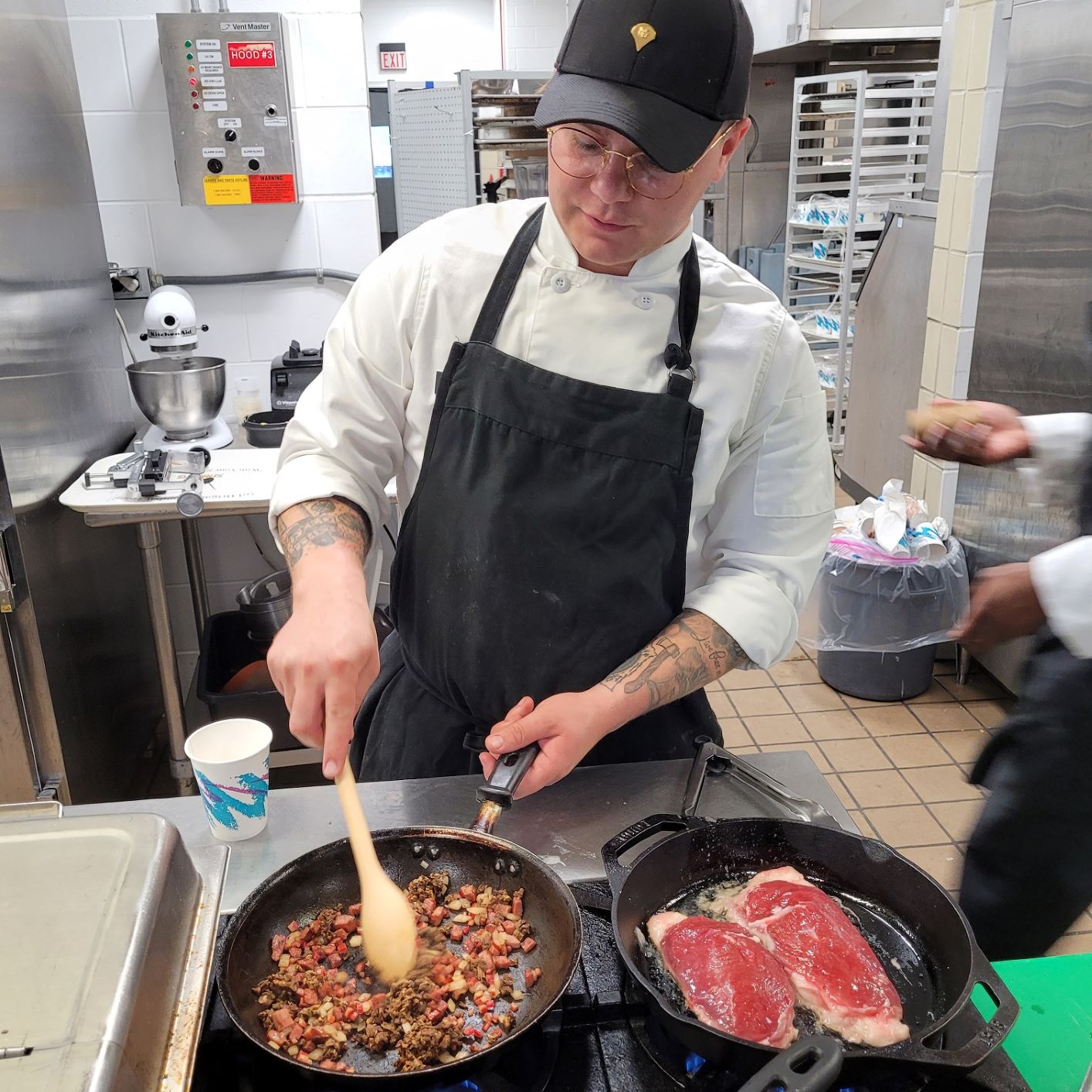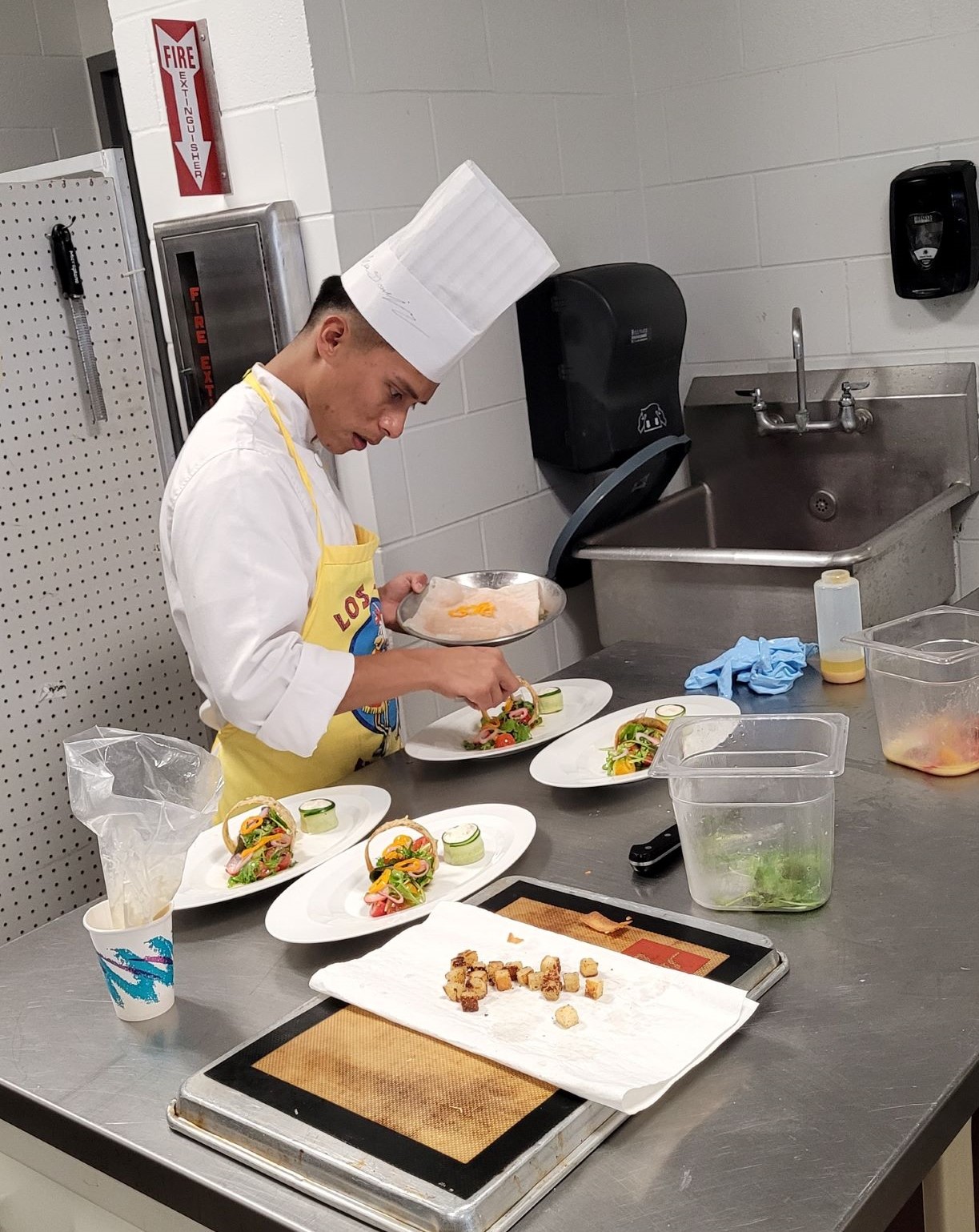



Members of the Fort Drum Student Chef Team have been training at the Fort Drum Culinary Arts Center since May, in preparation for the 2021 American Culinary Federation (ACF) National Competition in Orlando, Florida, Aug. 2-5. Clockwise from upper left: Spc. Dann Agcaoili and Pfc. Jennifer Payan work together on the dessert plate for the Student Chef Team menu. Spc. Kenny Driscoll decides which one of his fish appetizer plates will go on the viewing table and which will go to the judge’s table for tasting. Spc. Jonathan Arendale concentrates on cooking the entrée for the four-course menu. Spc. Noe Dominguez applies garnish on the salad plates during a run-through of the Student Chef menu. (Photos by Mike Strasser, Fort Drum Garrison Public Affairs)
Fort Drum Student Chef Team seeks perfection on a plate in preparation for national competition
Mike Strasser
Fort Drum Garrison Public Affairs
FORT DRUM, N.Y. (July 26, 2021) – The Fort Drum Student Chef Team has taken on the challenge of creating the perfect plate of food.
Since the beginning of May, five culinary specialists from across the 10th Mountain Division (LI) have reported daily to the Fort Drum Culinary Arts Center with the goal of creating a championship-winning menu for the 2021 American Culinary Federation (ACF) National Competition in Orlando, Florida.
Fort Drum earned entry to the ACF Nationals after winning the Student Chef of the Year title at the 45th Joint Culinary Training Exercise in March 2020.
The early part of the team’s training schedule consisted of orientating and instructing new team members unfamiliar with competitive cooking and advanced culinary skills.
Sgt. Joshua Hoyt, team coach and manager, said that three student chefs were recruited to replace others who moved to new duty stations or had other military obligations.
“When we first started training, you could see them improve by leaps and bounds every day,” he said. “That’s not to say that they ever stopped improving, either. They got better every day, and toward the end you were seeing improvements in the minute details.”
Hoyt said that the concept for the team menu is “summer on a plate.”
“We’ve definitely refined the plates along the way, but we all feel that we’ve maintained a menu that highlights fresh, seasonal food,” he said. “When you eat anything on the plate, it will have those summer flavors.”
That meant coming up with a way to elevate barbecue to fine dining standards, or capitalizing on the tomato varieties currently abundant at local farmers markets.
At ACF Nationals, student chef teams must produce a four-course signature menu for four (three portions for blind tasting by judges, and one for display). This consists of a fish starter, a salad course, a main course and a dessert, and the menu has to demonstrate classical cookery and modernist technique. The team is allotted 90 minutes to set up the kitchen, cook, plate their food and present the four courses.
The following Soldiers represent the Fort Drum Student Chef Team:
- Spc. Jonathan Arendale, 3rd Squadron, 71st Cavalry Regiment, 1st Brigade Combat Team;
- Spc. Kenny Driscoll, 41st Brigade Engineer Battalion, 2nd Brigade Combat Team;
- Spc. Dann Agcaoili, 1st Battalion, 32nd Infantry Regiment, 1st Brigade Combat Team;
- Pfc. Jennifer Payan, 1st Squadron, 89th Cavalry Regiment, 2nd Brigade Combat Team; and
- Spc. Noe Dominguez, 593rd Quartermaster Company, 548th Combat Sustainment Support Battalion, 10th Mountain Sustainment Brigade.
As one of the original team members who won the Student Chef of the Year trophy, Arendale said that it felt good to return to competitive cooking and practice his culinary skills again. The ACF Nationals were postponed from last year due to the COVID-19 pandemic, and the Fort Lee culinary event was cancelled earlier this year.
“For me, this is a nice way to cap off my time as a 92G (culinary specialist) here at Fort Drum,” he said. “I was lucky to get selected to the team right after I got here two years ago, so this is pretty much what I’ve been working toward the entire time I’ve been here. As soon as I get back from the competition, I will be leaving for the Pentagon.”
Arendale is responsible for the entrée, which features a seared duck breast with a sweet potato puree, and a cheddar and polenta croquette filled with braised duck thigh.
“I chose duck because I know it is a difficult protein, and I wanted to push myself,” he said. “The sweet potato puree is one of my favorite components to put on a dish. And I really thought a barbecue sauce would say summer on a plate.”
Other than the duck itself, the rest of the plate evolved over time.
“Originally the main sauce component was the blackberry wine sauce, which is still on the plate, but it’s more of an accent,” he said. “It was going to be a beer-mustard pan sauce, which we thought would be summery, but then over time we decided to go with something more distinctively summer that has the colors and flavors that really says summer.”
Arendale has worked in restaurants outside of the Army, and he also studied culinary arts in college. He said that his experience helped him take on more of a leadership role within the team.
“This is one of the first times I’ve had to help lead a group of people, and we’re all basically the same rank,” he said. “They all know I’ve competed before and that I live this life, so it’s been an interesting experience working with this team.”
Arendale said that he would compete again if given the opportunity.
“Competing gives you a chance to stand out among your peers, but it’s really not for everybody,” he said. “The culinary team is not a way to get out of the dining facility. We work so hard, every day, and we definitely don’t see it as a break from our regular jobs.”
Driscoll is the only other chef on the team with competition experience.
“I love everything about this,” he said. “I’m glad to be competing again. Honestly, I really feel like it’s a privilege to be here. You have to deserve to be here.”
Driscoll spent the past few months perfecting the fish appetizer – a potato-wrapped black cod over a sweet corn puree and corn relish. A shrimp-wrapped scallop and herb mousseline rests aside a squid ink coral crisp, surrounded by a tomato butter sauce.
At first, the fish did not have a crisp exterior or a marinade, while other components were added, removed or refined.
“We changed the sauce, we changed the custard foam to a puree and we switched some of the vegetables out with the sweet corn relish,” Driscoll said. “It changed a lot, but I’m happy with it. The flavors go really well together.”
Driscoll said that he was interested at an early age in learning cooking techniques, which is why he enlisted as a culinary specialist.
“I would watch the food shows and these master chefs on TV, and I always wanted to do that myself,” he said.
Dominguez also learned to love cooking at an early age.
“My career in life was always going to be cooking,” he said. “I started cooking when I was 7.”
He was one of the late additions to the team, but this kind of technical culinary knowledge was what he hoped to learn when he enlisted nearly four years ago.
“When they asked me if I wanted to do this, I said ‘yes,’ in a heartbeat,” he said. “Put me on the team.”
On most days, the student chefs arrive early at the culinary center for prep work and then complete two run-throughs of the menu from start to finish. In between the 90-minute sessions, the chefs critique each plate and discuss how they can improve.
Naturally, Dominguez had some doubts about participating in a national competition without any formal experience.
“All of these doubts I was having went away as the days went by,” he said. “And I felt, ‘Yeah, I’ve got this. This is not that bad.’”
The salad may seem like the easiest plate to make on the menu, but Dominguez would argue against that notion.
“It’s the most complicated salad I’ve ever made in my life, frankly,” he said. “It begins with baking a cake, and that cake becomes croutons.”
From there, he bakes tuiles (wafer-thin herbed crisps used for fancy garnish), pickles the vegetables and whisks his own white balsamic vinaigrette.
He said that learning different knife cuts and assembling all of the components into a visually pleasing design were his biggest challenges.
“I love cooking, but the plating was frustrating,” he said. “I like attention to detail, so if something is slightly off on the plate, I get irritated, and then I spend even more time trying to make it right. I just want it to be perfect every time.”
In that pursuit for perfection, Dominguez said that he absorbs every bit of feedback he can get.
“I’m always thinking about what the judges are going to say, so I’m preparing myself for harsh criticism,” he said. “But I like that, and I don’t think of it as criticism but as advice on how to improve. Anyone can say, ‘good job,’ but that doesn’t tell me what was good, what was bad and what they didn’t like.”
Until now, Dominguez said that he never spent much time at all preparing salads, so he is glad to have acquired this culinary knowledge.
“You know, it was all about focusing on what I was doing and giving all the effort I can,” he said. “Eventually, it just clicked and became easy.”
When Payan showed up for the first team meeting, she said that she was nervous and let everyone else do the talking.
“I was quiet and shy, but I did the work I was supposed to do,” she said. “But looking back now, my confidence has grown, and now that I have had the opportunity to learn so much I can see how I’ve progressed.”
Payan worked primarily on the dessert plate with Agcaoili, and this was her first experience baking from scratch.
“Baking was something I always wanted to learn, and a lot of people told me it’s something no chef wants to do,” Payan said. “I don’t think I had a hard time learning how to bake because I actually love doing it.”
She also gained an appreciation for the art of plating food.
“I’ve learned that there many different ways to stylize a plate,” Payan said. “It’s one of the most important things to learn for the competition. So I’ve taken this into consideration a lot, and I have been practicing it every day.”
Payan said that she watched the other chefs cook throughout the training so she could learn something from every plate on the menu.
“To this day, I’m still trying to figure things out and learning the names of everything on the plates,” she said.
Mostly, Payan said she is grateful for the chance to be on this team and to show her potential as a culinary specialist.
“It means a lot to me because I never thought I would have an experience like this,” she said. “It was a surprise to me, but it’s something I love doing.”
The dessert she is making with Agcaoili is a white chocolate and lemon curd-filled pistachio cake topped with honey mascarpone cheese. Also on the plate is a salted brandy snap with basil meringue, accompanied by macerated summer berries, a tart rhubarb sorbet and a strawberry soup.
“I am very proud of the dessert,” Agcaoili said. “I think we’ve improved on it every single day.”
Agcaoili said that he was a drafting student in the Philippines, where he learned the basics of architecture and design. Assembling a dessert requires similar applications of skill and knowledge.
“Desserts have a lot of components to it, and you have to construct it in a very certain way,” he said. “Pfc. Payan and I divided up the components and, at first, we had a hard time with it but we eventually got it.”
Agcaoili said that he used to spend several hours just practicing one component until the team eventually mastered them all within the 90-minute time limit.
“It feels great when we finish,” he said. “Doing this repeatedly, it’s hard, but it is worth it at the end. This is a big deal for us because we are representing the whole Army and DoD (Department of Defense). So we’re just trying to do our best every single day.”
Hoyt said that no military team has ever won at ACF Nationals, but the 2019 Student Chef of the Year team from Fort Drum placed third.
“That’s a story that is told to us, I guess, to motivate us or encourage us to do better,” he said. “If that team was the first to even place, then you guys have to be the first to win.”
The fact that Fort Drum was able to claim the Student Chef title two years in a row is an accomplishment that Hoyt said made people take notice of the culinary specialists on post.
“It recognizes the hard work that Fort Drum is putting into the culinary arts program, and it opens the chefs to potential job opportunities in the military, as well as civilian-wise,” Hoyt said.
Currently, team members are honing their skills and receiving further mentorship and guidance from the culinary professionals at the Joint Culinary Center of Excellence at Fort Lee, Virginia. From there, they will depart to the ACF National Convention, which will run Aug. 2-5 in Orlando, Florida.
“Just going to Nationals is going to be an amazing experience for them,” Hoyt said. “The convention has master classes where they have opportunities to learn the same things that experienced chefs will be learning.”
The annual convention is the largest gathering of chefs, students and food service professionals in the U.S., and it features an array of cooking demonstrations, networking and social functions.
“The ultimate goal of this is really for them to learn from this experience,” Hoyt said. “They will learn new trends and what’s up-and-coming in the food industry. The opportunity to bring all that knowledge back to our culinary program and to our dining facilities is where we should focus our attention. Obviously, winning would be nice, too.”
A photo gallery of the Student Chef Team training at the Fort Drum Culinary Arts Center is available at www.flickr.com/photos/drum10thmountain/albums/72157719593450754.





